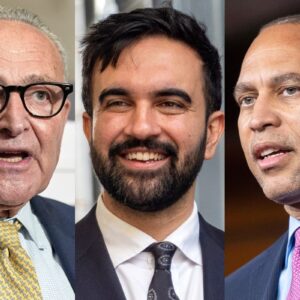said Thursday that House Democrats will soon launch investigations into potential wrongdoing in the wake of President Trump’s surprise decision a day earlier to pause his reciprocal tariffs — a move that immediately caused stocks to soar.
Jeffries said the Democrats will also be examining whether any House GOP lawmakers were given advance notice of the tariff freeze — and made market moves accordingly.
“We need to get to the bottom of the possible stock manipulation that is unfolding before the American people, including what, if any, advance knowledge did members of the House Republican Conference have of Trump’s decision to pause the reckless tariffs that he put into place?” Jeffries told reporters in the Capitol.
Unveiled last week, Trump’s “reciprocal” tariffs rattled global markets and prompted a stock sell-off on Wall Street, where more than $6 trillion in wealth evaporated over the course of two days.
Despite the volatility — and the promises from the administration that the tariffs would remain in place indefinitely — Trump posted a message on social media Wednesday morning advising followers to invest.
“THIS IS A GREAT TIME TO BUY!!! DJT,” he posted on Truth Social, the media platform that he also owns.
Several hours later, he announced that he was backing off the blanket tariffs, rolling the rate down to 10 percent for virtually every trading partner except China. The move triggered a buying frenzy that sent the markets soaring in the sharpest one-day jump in almost two decades.
The sequence of events has prompted questions about whether Trump — who’s been under heavy pressure from his business allies to abandon the tariffs — used his presidential powers to goose the market for political gain.
It’s also raised questions about which of his allies, if any, had prior knowledge of his pause decision, and whether they traded stocks on that information.
There are various federal laws that prohibit insider trading — the general act of buying or selling an investment product based on significant information not available to the public.
But Congress more than a decade ago adopted tougher rules that prohibit sitting lawmakers from trading on nonpublic information they might glean from their positions on Capitol Hill.
Jeffries said Democrats will examine both issues.
“There are several members of Congress who will be aggressively demanding answers and transparency, particularly as it relates to stock purchase decisions that may have occurred over the last few days,” Jeffries said.
It’s unclear which Democrats will take the lead in those investigations, or what powers they have from the minority to ferret out the information they’re after. Jeffries emphasized, however, that House lawmakers are already required to disclose their stock trades within a relatively short window of conducting them.
“Members of the House of Representatives will have to disclose any stock trades that they’ve made 30 days from the date of those trades, or potentially no later than 45 days. And so the reality is, people are going to have to pay the piper in terms of disclosure,” Jeffries said.
“Our point is: You might as well get it out into the public domain now, because it’s coming later,” he added. “And there’s nothing that you can do about it.”





